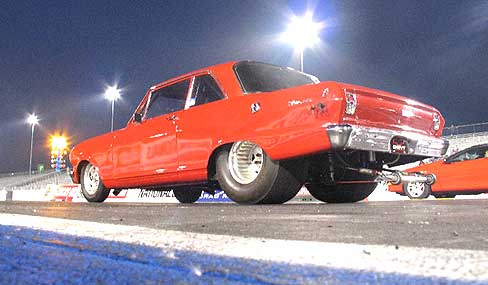

SCSS STREET CAR SHOOTOUT RESULTS - 6/28/2005

W: William Eberhart, Jr., Florissant,
MO; 1964 357 Nova, 0.039, 11.103/122.85
RU: Derrick Roeslein, Fenton, MO; 2002
346 Camaro, -0.015, 11.137/120.66
"Wild Bill" Eberhart, whose bright red Chevy
Nova had earned a runner-up in the second event of the year,
pulled off an even bigger upset to win the twelfth event
of the 2005 SCSS Street Car Shootout Series title at Gateway
International Raceway. The Florissant, MO, driver had set
a record of sorts during the April 5th SCSS event when he
was inserted into the final round as the eighth alternate.
Incredibly, he was again called to the lanes as an alternate
but parlayed his most recent opportunity into his first
victory.
Competitors were greeted by abysmal conditions when timed
trials began. With an ambient temperature of 94 degrees,
a corrected elevation of 3200 feet above sea level and a
123-degree track surface, only the most experienced racers
avoided tire spin. Luckily, a brief rain shower cooled the
surface to 105 degrees and, after a lengthy clean-up when
Darien David's 11-second '87 Regal blew a transmission,
conditions eventually improved to 2450 feet corrected elevation
although the track temp never dropped below 95 degrees and
the air temperature was still 85 degrees when the event
concluded.
The very first car down the track, past SCSS winner Derrick
Roeslein's pewter 2002 Camaro, spun hard to an 11.41/119.88
with a 60-feet elapsed time of 1.71 seconds, nearly two-tenths
of a second slower than the wheelstanding Chevy's normal
efforts. Six minutes later, however, fans watched the nitrous-aided
1965 351 Mustang of Hillsboro, Missourian Jeff Litzsinger
blast to 10.62 at only 100 miles per hour after also losing
traction. The blue-on-white Ford still clocked a tremendous
6.51/114.25 eighth-mile, giving an indication of its potential.
When qualifying finally began, Litzsinger quickly took the
pole with another problem-plagued run of 11.03 at only 95
mph after a 6.62/112 eighth.
With the newcomer in the Mustang leading qualifying, a
tremendous battle began for the number two position and
a spot in the final round. Tony Huff's familiar red '67
Camaro hit back-to-back runs of 11.42/115 and 11.38/116
only to quickly be surpassed by Eberhart's Nova at 11.335/119.64.
Three pairs later, Kevin Kolkmeyer's blue Illinois 2002
Camaro nipped Eberhart with an 11.330/121.55 and, two pairs
later, Roeslein shot to an 11.13/120.93. The Fenton, MO,
driver solved the tire spin issues by dropping his starting
line launch RPM from 5000 to 3600. "I just ran 11.03/121
at the last Midnight Madness event in much better air,"
said Roeslein after the improvement, "and I found out
at that event that I just don't need that much RPM to get
traction."
The battle wasn't over, however. Eberhart's "Nova
Madness" machine showed its consistency with an 11.333/117.42
and then, after the rain and clean-up delays, Roeslein improved
to an exceptional 11.103/121.41. Eberhart quickly returned
and hit 11.099/123.62 to move back into the second position,
but Roeslein's silver Z28 countered that run with an 11.088/121.27
in the last two minutes of qualifying to steal the finalist
slot for good and guarantee an appearance in his fourth
SCSS championship match. Amazingly, Eberhart was the first
car to run after qualifying ended and hit 11.092/123.19!
Unfortunately for low qualifier Litzsinger, an 11.25/91
qualifying attempt after his initial 11.03 incurred enough
damage to end the Ford's event. For the second time in 2005,
Eberhart was called as an alternate to the staging lanes
to run in the final, this time against an almost equal opponent.
In what was anticipated as one of the closest SCSS trophy
dashes ever, Eberhart pulled through the water box but was
unable to get the tires wet, leading to several aborted
attempts at a tire-heating burnout. "I didn't know
what was going on," Eberhart later recalled. "I
thought my Line-Loc was going out and I kept wondering how
I was going to stage this thing! I really didn't know what
was going to happen when I left the line." Roeslein
knew the race would most likely be determined by the best
reaction time. "We were only a few thousandths apart
in qualifying," said Roeslein, "so I knew it was
going to be a heck of a race."

